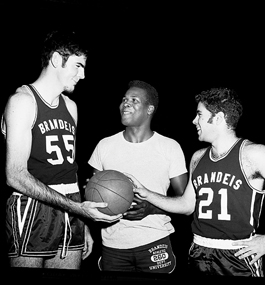Remembering K.C. Jones at Brandeis

K.C. Jones (center) during his Brandeis years. (Courtesy Robert D. Farber University Archives and Special Collections Department, Brandeis)
by Stuart Weisberg ’71
Boston Celtics great K.C. Jones, who died on Dec. 25 at age 88, and I both entered Brandeis in the fall of 1967. I was a first-year student. K.C. was the new head coach of the men’s basketball squad.
A few months earlier, K.C. had retired as a Boston Celtics player after winning eight straight NBA championships. The Commonwealth of Massachusetts and the team honored him with a K.C. Jones Day at Boston Garden. A sellout crowd and a national television audience saw him showered with praise and gifts, including a Cadillac with a solid-gold ignition key. (K.C. burst into laughter when Bill Russell, his Celtics teammate and college roommate, presented him with a chauffeur’s cap to go with the car.)
On Oct. 16, K.C. blew a whistle to start his first practice as coach. It was a happening at the Shapiro Athletic Center. More than a dozen reporters, several photographers and even a television camera or two were there. Celtics teammate Satch Sanders was on hand to lend moral support. K.C. addressed almost 30 hoops hopefuls, a record turnout for Brandeis.
Several weeks later, the freshman team, of which I was a member, needed another player to round out a full-court practice, and K.C. agreed to play. Finding myself playing opposite him, I was determined not to be psyched out by his reputation as perhaps the best defensive guard in NBA history. I started popping from the outside, dribbling behind my back, driving by him for easy layups. I was happy beyond words.
In the locker room after practice, I heard K.C. tell one of my teammates, just loudly enough for me to hear, “Look how good I made Stuie feel by letting him score off me. Now he has something to write home to Brooklyn about” — which I did.
After I joined the varsity team, I experienced a more aggressive, tenacious K.C. Jones on the court. One day after practice, some of us played three-on-three, with K.C. shadowing me on defense. I spent most of the game on the floor, knocked down by him again and again.
As a coach, K.C. never ranted or raved. If a player made a mistake, he would take him aside and talk to him privately. Unlike many coaches who stand on the sidelines at practice and tell their players what to do, K.C. was on the court demonstrating what he wanted. His players had endless admiration and respect for him. One look from him was enough to get them to play their best.
At the end of K.C.’s first season at Brandeis, the Judges played the Coast Guard Academy in Connecticut. The team went all out for K.C. and won by a convincing 102-89 score, thus giving Brandeis a winning record for the season, its first in six years.
The team bus stopped at a New London restaurant for an impromptu celebration. The beer, soda, pizza and sandwiches were flowing. Asked to make a speech, K.C. said simply, “All that I can say is that I want to thank all of you for all that you have done for me this season,” humble words that earned him loud applause, even from the restaurant patrons who just happened to be there. The jukebox came on, and a Brandeis cheerleader asked K.C. to dance. He slowly rose from his chair; unbuttoned his blue sport jacket; dropped his modest, reserved manner; and did a sharp, swinging dance to the music of the Four Tops.
The K.C. Jones era at Brandeis, with a 36-33 winning record, came to an end in April 1970, when he became an assistant coach at Harvard. An illustrious coaching career lay ahead of him, including five seasons as head coach of the Celtics, guiding Larry Bird, Robert Parish, Kevin McHale and their teammates to NBA championships in 1984 and 1986.
In the fall of 1971, I was in my first year at the University of Pennsylvania Law School. K.C. was then an assistant coach with the Los Angeles Lakers, who were in Philly to play the 76ers. At halftime, with the Lakers ahead by 29 points, I went down to their bench to say hello. When K.C. saw me, he exclaimed, “How are you doing, Stuie? Where are your sneakers? Everyone is going to get in the game tonight!”
Rest in peace, K.C., my coach and friend.
Stuart Weisberg, who served as chairman of the Occupational Safety and Health Review Commission during the Clinton administration, is the author of the 2009 authorized biography “Barney Frank: The Story of America’s Only Left-Handed, Gay, Jewish Congressman.”
